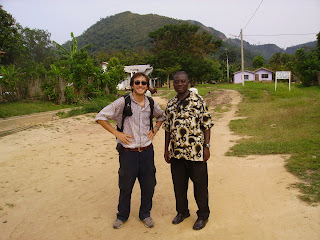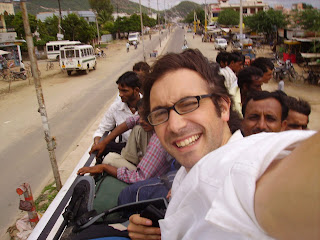The first time I wrote about guns in
The meeting was sponsored by a group called the Ghana Action Network on Small Arms (“GHANSA”) which is a branch of the West Africa Action Network on Small Arms (“WAANSA”), although they seem to share all the same staff and resources. Again, I was the official note taker. However, I’m also a known constitution writer, so I’m part of a small group charged with writing GHANSA’s constitution. Writing constitutions is like riding a bicycle: once you learn, you never forget. Or so I hope. . .
Small arms are things like shot guns, assault rifles, pistols. Basically, any weapon that can be operated by one person. Kofi Annan, the former U.N. Secretary General and perhaps the most famous Ghanaian in the world, has called small arms “
Tragically, most countries in
One of the things I learned at this meeting is that, in the West, we tend to think about these conflicts as about oil or diamonds or some weird geological struggle against militant Islam or communism or whatever. Those might be the reasons why no one tries to stop the conflict, and it might be the reason why some people keep it going, but its rarely the cause. Look at it this way: the Africans who fight those wars are not fighting for oil or diamonds or Islam or communism. The tribes fight because, if they don’t, the other tribe will get their lands and they will end as up refugees or worse. However, since most people in the west don’t know a Ewe from a Fante (two of
Most West African countries don’t have the capacity to deal with issues of tribal conflicts and guns. They just wait for a conflict to erupt and hope that it does not swallow the country. In only a few countries,
Most of the meeting was dedicated to educating interested organizations about the Economic Cooperation Organization of West Africa (“ECOWAS”) Covenant on Small Arms and Light Weapons, Their Ammunition and Other Related Material (“The Convention”). The Convention requires West African countries to adopt stricter gun control laws, and monitors arms procurements by governments in the sub-region. Its been adopted by ECOWAS, and now it needs to be adopted by at least nine member states. There needs to be some lobbying to get that happen because countries are not excited about changing their gun laws and are giving up a little bit of sovereignty to a multi-lateral organization. (Sound familiar?). It’s a well written convention and most of the people at the meeting were on the ball, so I think ratification (at least by
By the way, there is also an international treaty on small arms, called the Arms Trade Treaty, which is currently being debated in the U.N. Its similar to the various treaties that govern nuclear proliferation, and puts in place a monitoring regime to control the flow of small arms around the world. Unfortunately, the countries who sit on the Security Council and have the final say on the adoption of the ATT,
The other result of the proliferation of small arms is crime, or, as the Ghanaian say “armed robberies.” Crime featured prominently in the discussion. In
So what are the police doing about it? Well, not much. A police superintendent addressed the meeting. After telling people what they already new (that crime is out of control in some areas) he explained the limitation of the police’s ability to combat crime. And the limitations are pretty all encompassing: intelligence, competency, and logistics. Is there anything they are doing right? Nope. In fact, the police are part of the crime problem. For one, police corruption is so bad that some police officers actually rent their weapons out to criminals to commit crime. Second, no one will give the police any information about crime since the police are as likely to tell the criminals who is informing on them as to investigate the tip. Most people who had been victims of crime stated that the police were totally uninterested in helping them, let alone investigating the crime.
Actually, the police are out looking for armed robbers. Really, they are. I can attest to that, personally. Two weeks ago, my friend was pulled over. I was in the car. The police officers who pulled us over (actually, they just blocked the road and commanded us to get out of the car) explained that they were searching for armed robbers. After a thorough search of the car, they did not find any guns or evidence that we were, indeed, armed robbers. What they did discover was that my friend did not have a driver’s license (its still unclear to me if he forgot his license at home, or simply does not have one). He also did not have a fire extinguisher in the car, as every car in
I was asked by one of the participants at the meeting why nice homes in
Dime Store Monetary Policy
Still on the topic of crime, someone is stealing my money here in
How? It works like this: because of the irresponsible tax cuts and a pointless war (both brought to you by the Republicans with the help of some less than principled Democrats),
Bush’s “borrow and spend” policy is, in reality, called the “weak dollar policy.” Its a pretty simple policy: keep spending, keep borrowing and, because there is no fiscal discipline, no one has any confidence that American assets are worth anything, and stays away from them, including dollars. If the government wants a strong dollar, low taxes and lots of spending (wants it all!), it needs to raise interest rates on government bonds. Unfortunately, raising interest rates slows economic growth. For a few reasons, it is out of the question at the moment. So our government keeps spending and borrowing at low interest rates and the value of the dollar keeps dropping. Granted, no one except foreign investors and Americans who travel abroad give a damn about the value of the dollar. But have some compassion: it costs me 10% more to get drunk in
Sorry, I had to vent.
Update
This past week has been pretty exciting. Wednesday I went to the finals of a “Four Nation Tournament” featuring the
Note that they don’t serve beer in the stadium, which makes it the only place in
On Thursday, while everyone at home was eating a Thanksgiving dinner, I went for Chinese food. Then I played some trivia at one of the expat bars. Friday I went to a play at the National Theater, which was pretty good. The play was sponsored by the Ministry of Health and was free. Before the play, the Minster of Health, or someone who represented him (it was unclear), gave a speech about healthy living and the importance of preventive medicine. The play itself was a retelling of a Ghanaian legend in which a woman loses her arm and is mercifully given a new arm (by a sea serpent). Seems to me that losing an arm and then miraculously getting a replacement arm has nothing to do with preventive medicine (its actually the opposite), but no one else, least of all the Minister of Health, was bothered. Also I finally got my passport back on Friday, although I had to go to the Immigration Service twice in the same day to make that happen.
Saturday night I was at
Unfortunately, my trip is winding down, just when I was really getting into the swing of things (note- if you are going to move somewhere and try to make friends, stay for more than 10 weeks). I return to the states in three short weeks and I plan to travel to the north of
In any event, if anyone has any requests for souvenirs, or some other Ghanaian/African novelty they can’t find in
















